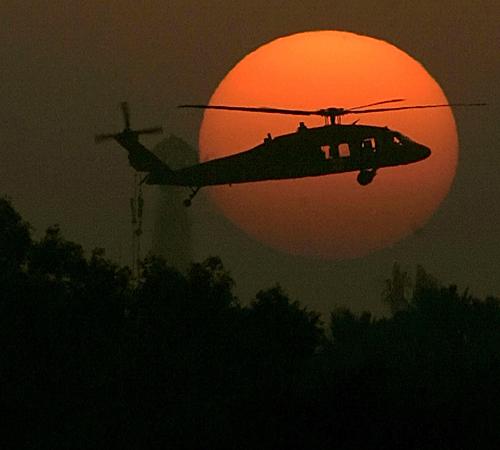Iraq moves draft law forward to lift security firms’ immunity

A U.S. Army Black Hawk helicopter flies as the sun sets over Baghdad on Tuesday. The Iraqi government on Tuesday approved draft legislation lifting immunity for foreign private security companies. Marko Drobnjakovic, The Associated Press
October 31, 2007
BAGHDAD – The Iraqi government approved a draft law Tuesday to lift immunity for foreign security companies including Blackwater USA, a bid to overturn a decree imposed more than three years ago by the U.S. official who ran the country after the American-led invasion.
The legislation could have a chilling effect on security companies operating in Iraq, though the vast sums they and their guards are paid are likely to weigh more heavily than the possibility of legal jeopardy.
The draft law, expected to be passed overwhelmingly by parliament, is also certain to deepen tensions between the Bush administration and the Iraqi government.
Prime Minister Nouri al-Maliki has promised to push through the legislation amid public outrage over Blackwater’s seemingly unprovoked killing of 17 Iraqis last month as well as a series of other Iraqi civilian deaths allegedly at the hands of foreign contractors.
The U.S. and Iraq were already at loggerheads over Blackwater, which guards American diplomats in Iraq. The problem was compounded by reports that the State Department’s Bureau of Diplomatic Security granted limited immunity to the Blackwater guards involved in the Sept. 16 shooting in west Baghdad’s Nisoor Square.
Get The Daily Illini in your inbox!
Because the Iraqi draft law would not be retroactive, any punishment for those shootings would be left to the United States, said Iraqi government spokesman Ali al-Dabbagh. It is unclear what U.S. criminal laws might cover acts in a war zone; civilian contractors cannot be tried in military courts.
A Pentagon official said Tuesday that Defense and State department officials had reached a “general understanding” that the American military command in Baghdad should have more oversight of the U.S. government’s private security contractors in Iraq.
“We need to be more clear” on rules for the use of force and coordination of the movement of the contractors, whether they work for the State Department or the Defense Department, Pentagon press secretary Geoff Morrell said.
On Capitol Hill, Democrats criticized the Bush administration for giving immunity to the bodyguards, calling the move a failure to hold the security contractors responsible for the shooting deaths.
Senate Judiciary Chairman Patrick Leahy, who sits on two Senate panels that oversee the State Department and the Justice Department, called the deal an example of “the amnesty administration.”
Sen. Barack Obama, the Illinois Democrat running for president, demanded to know whether Secretary of State Condoleezza Rice was aware of the immunity offers and agreed with it. In a letter to Rice Tuesday, Obama asked whether the FBI and Justice Department were consulted before limited immunity was offered.
The White House had little to say about the matter Tuesday. President Bush ignored a question on the arrangement shouted after his meeting with the president of Uganda. And his spokeswoman dodged most questions about it at her daily briefing for reporters, referring them to the State Department.
“It is under review,” White House press secretary Dana Perino said. “Anyone who has engaged in criminal behavior will be prosecuted.”
The State Department, whose investigators initially promised to shield the bodyguards’ statements in the criminal inquiry, maintained that any lawbreakers “must be held to account” as a result of the inquiry that has since been taken over by the Justice Department and FBI.
The offer for limited immunity has delayed the government’s criminal inquiry of the shootings and threatens to derail prosecution as investigators seek other evidence from the crime scene now six weeks cold.
The deal would not prevent the Blackwater guards from being prosecuted in U.S. courts. However, prosecutors would have to prove they did not use information gleaned from the bodyguards’ statements – or anything related to them – when seeking criminal charges. Investigators would have to find other credible witnesses or evidence to make their case.
Al-Maliki has demanded that the United States end its relationship with Blackwater within six months and that $8 million in compensation be paid for each victim. Blackwater is the largest private security firm protecting U.S. diplomats in Iraq.
U.S. officials in both Baghdad and Washington have said nothing publicly about al-Maliki’s demands, which he issued on the recommendation of an Iraqi investigative committee that studied the Sept. 16 incident.
The committee found the Blackwater guards opened fire without provocation. The company has said its guards came under fire before using their weapons. No witnesses, however, have been found to corroborate that claim.
An initial incident report by U.S. Central Command, which oversees military operations in Iraq, also indicated “no enemy activity involved.” The report says Blackwater guards were traveling against the flow of traffic through a traffic circle when they “engaged five civilian vehicles with small arms fire” at a distance of 50 yards.
Blackwater spokeswoman Anne Tyrrell declined comment Tuesday on the Iraqi draft law.
The legislation would overturn an immunity order known as Decree 17 that was issued by L. Paul Bremer, who ran the American occupation government until June 2004, al-Dabbagh said.
Associated Press writers Sinan Salaheddin and Lara Jakes Jordan contributed to this report






